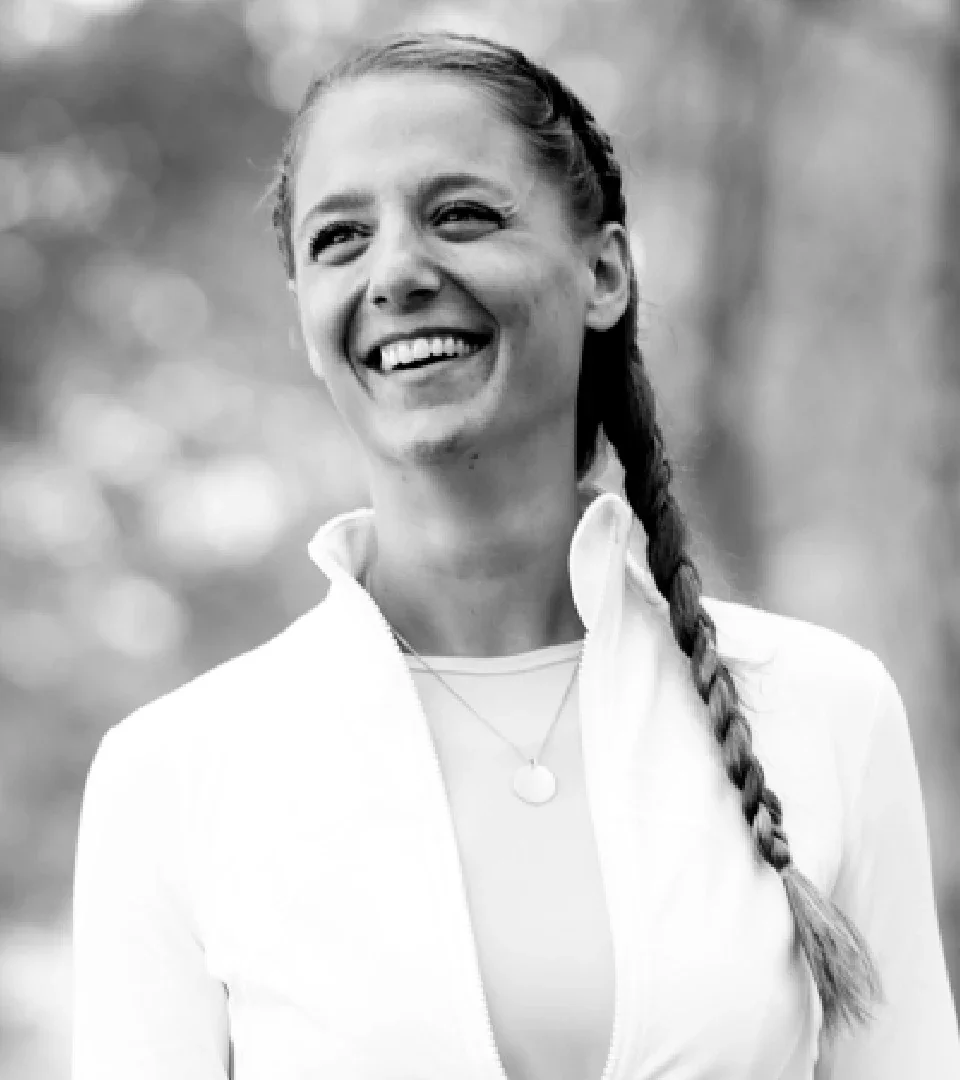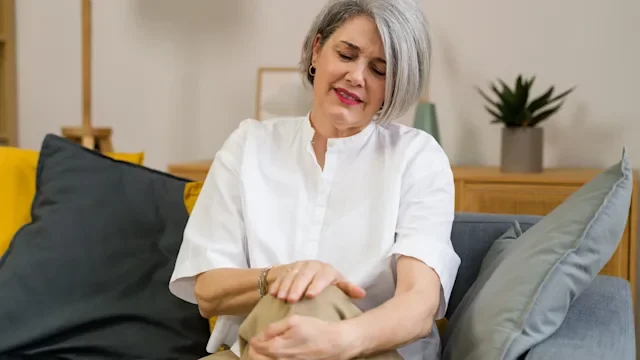Key takeaways:
Alison Feller was diagnosed with Crohn’s disease when she was 7.
Her life revolved around dance. Then she got hooked on running.
Crohn’s sometimes complicated things, but it hasn’t stopped her from pursuing her passions, including becoming a mother.
At age 25, Alison Feller was living her longtime dream: working in New York City as the top editor of a dance magazine.
But one day, after a whirlwind photo shoot with pop star Beyonce’s backup dancers, she walked into the city streets and threw up in a trash can.
For Alison, it marked the start of a brutal flare of Crohn's disease, which had been an intermittent presence since childhood. Two days later, she was in the hospital.
She was so sick, she couldn’t eat. She was in the bathroom 30 times a day, she says, unable to leave her apartment once discharged. Then she had to go on medical leave, putting the dream job she had worked so hard to reach in jeopardy.
“It was a dark time,” Alison says. “I wouldn't even open the shades in our apartment. I would just sit on the couch in the dark, and I would cry for hours.”
Crohn’s disease would change her life in ways both minor and profound, leading to both struggles and new opportunities, including becoming an advocate for Crohn’s patients.
Crohn’s disease: A chronic inflammatory disorder
In the U.S., about 3 million Americans have Crohn’s or ulcerative colitis, two of the main inflammatory bowel diseases, according to the Centers for Disease Control and Prevention.
Crohn's is a chronic disease that can cause inflammation of any part of the digestive tract. Symptoms can include pain, severe diarrhea, nausea, vomiting, fatigue, bloody stools, and weight loss. For some, including Alison, Crohn’s can affect many aspects of life. And while there’s no cure, medications can help manage symptoms and periods of relapse.


“It can be really scary and really overwhelming and really frustrating when it feels like nothing is working. But you've got to stay in it, because you deserve to have a good and fulfilling life.”
- EntocortBudesonide
- Azulfidine En-TabsSulfasalazine DR
- Exclusive discountAdalimumab-adbm
For Alison, who grew up in Contoocook, New Hampshire, Crohn’s first appeared at age 7. She was on a summer vacation near Mt. Washington with her extended family. She started throwing up on a railway ride and had been losing weight.
“My dad took me to the hospital so that we could figure out what was going on. And they did a whole bunch of tests,” including an endoscopy, she says, leading to a diagnosis of Crohn’s disease. “None of us had ever heard of that.”
Her doctors put her on a high dose of steroids and, within days, she was feeling better. Although she worried about missing school, dance classes, or Girl Scouts, occasional bouts with Crohn’s became more manageable with steroids.
“In my childhood, the disease wasn't that bad. I don't even think I flared every year — it was maybe every other year. So it just wasn't that big of a deal,” she says. “It wasn't until I was in college that it started to get worse.”
She studied journalism at Quinnipiac University in Connecticut, in hopes of working at Dance Spirit Magazine one day. Crohn’s flares seemed to arrive with stress, she says, such as when she studied abroad in Australia.
Her symptoms could include bloody or urgent diarrhea, joint pain, and fevers. But by then, steroids weren’t easing flares like they once did.
After an internship at Dance Spirit, she landed a job there. Several years later, she was promoted and soon was leading the magazine — though the job could be stressful.
After suffering one of her worst flares, Alison tried a range of medications and dietary changes, such as cutting out dairy and gluten.
She tried acupuncture, but it proved difficult. “I would be laying on this bed, naked, with needles in me, and I would need to go to the bathroom. And what do you do?” she says.
In 2014, she left her job. As heartbreaking as it was, “I knew it went on for so long that if I didn't actually make a big life change, nothing's going to get better,” she says.
“It was about 2 years before I felt OK again.”
Bathroom anxiety and dating challenges
Even then, she says, living with Crohn’s had an impact on her life in almost every way.
An avid runner, Alison says jogging in New York meant anxiety about having to suddenly use a restroom.
“Out of nowhere, I have to absolutely sprint for a restroom. And if there is not one 6 seconds away, I'm not going to make it and I can't hold it. And there's nothing I can do about that,” she says. “It's embarrassing. And, of course, there's a stigma.”
Crohn’s also added challenges to dating, including when she started dating Brian, who is now her husband.
“I lived in a studio apartment in New York City, and he had a one-bedroom apartment. And his bathroom door did not close all the way. I would get so much anxiety … I would leave at 5 a.m. to go to the Starbucks down the road to go to the bathroom,” she says.
Becoming a Crohn’s advocate
Alison started a running blog called Ali on the Run and began to discuss Crohn’s. She found a receptive audience in those who perceive a stigma with the condition’s “bathroom stuff” symptoms, which some find difficult to discuss, she says.
“People would search running with Crohn's disease, and they would find the blog and we would connect in the comments. And it really grew from there. That was pretty cool: To not only realize that I wasn't alone, but that I could help other people feel that way,” she says.
Alison became a freelance writer and created a podcast that grew out of her running blog, which is now her full-time job. In addition, the couple has moved to New Hampshire.
Working at home without a commute and running in forested areas is far less stressful, she says. While some people require surgery with the condition, she has avoided it.
These days, she says, flares still happen about once a year, including one during the stress of the pandemic. She takes a medication called Stelara, which targets immune response and inflammation.
Finding more opportunities than limitations
She has changed her life in other ways, too: She stopped running marathons, which can prove too much, she says. She also avoids foods that seem to cause her problems, such as popcorn and jicama. But she hasn’t focused on limitations. In 2018, she gave birth to her daughter, Annie.
One thing she has learned is how important it is to “relentlessly be your own advocate,” she says.
“You will have to stand up for yourself and call the doctor's office every single day when they say ‘our next available appointment is in 3 months,’” she says.
And while living with Crohn's can mean costly health insurance and additional care, such as mental health therapy or acupuncture out of pocket, she says perseverance is critical in managing it.
“Medication might not fix you overnight. A lifestyle change might not fix you within a few hours,” she says. “It can be really scary and really overwhelming and really frustrating when it feels like nothing is working. But you've got to stay in it, because you deserve to have a good and fulfilling life.”

Why trust our experts?

















